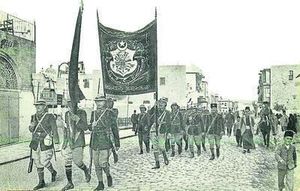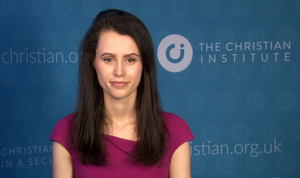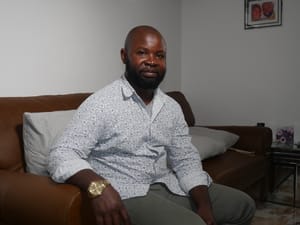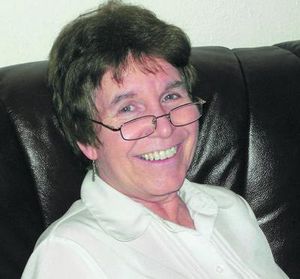Continued from Armenians, ‘experts in the art of dying’ — and also in the art of living (1)
Christian evangelist Roger Carswell has provided this edited version of a booklet first penned by his grandfather, Rev. Sisag Manoogian, at the time of the Armenian genocide (1915–1917). Sisag continues:
I keep a small photo which shows the deportation of women and children from one village. Their husbands and sons were driven into the desert some few months previously. These women were gathered by gendarmes and sent after them to roam in the desert until some at least should meet merciful deaths, as did their husbands.
Armenian suffering
After the war was over, some of these women who lived came back. All were emaciated. The village once more flourished, till the present Turkish atrocities began by the killing of six Armenians from this village. Nor were the criminals punished, nor any proper measures taken by the French to prevent a repetition. So, not long after, the same village was surrounded by the Turks.
During the fighting, the Turks captured some more Armenians and killed them after terrible tortures, but when Armenians captured several Turks and brought them into the village, instead of retaliation they kept them safely in the schoolroom.
They fed them and clothed them for months. They read the Bible to pacify their fear, by showing that the Christian religion does not allow us to kill our enemies. At last, some Armenian soldiers, by the help of the French, went to bring the village people down to Adana.
Then the pastor took the Turkish captives to the border and released them. They went rejoicing and praising them for their unique Christian ‘revenge’.
Armenian hope
I need hours to tell you that this kind of ‘revenge’ was not an exception, but an example of many like deeds in Caucasia, Syria and Cilicia. The Armenians still have hope in the hopeless Turk.
Our experts steadily look for a time in which Turkey shall be illuminated with Turkish pastors and preachers of the gospel. Then the world shall understand that God has graciously used even the blood of Armenians as ‘the seed of the church’ to accomplish what the Armenian life has failed to do.
This is the dream that many Armenians dream. This is the vision that many have long followed. Even the writer can humbly confess that he and his family are the followers of this ‘ridiculously bold’ vision.
They can never forget the dragging months they spent in hiding in the dark dens and attics of Aleppo, especially the days when the anger of infuriated Turks was in its zenith, determined to find the last Armenian in order to cast him out into the barren desert.
The Turks packed and tied poor young widows in Oriental oxen carts and drove them through crowded main markets, while the victims were screaming and pulling their hair in agony.
Hundreds of men looked at them, but no helping hand could be stretched out. In those helpless, hopeless days, the writer, his wife and his old mother repeatedly knelt down to pray for the forgiveness of such matchless sin.
They could not feel satisfied till they took their only child, a boy of two and a half years, and, putting him before God, sincerely and solemnly dedicated him to be a worker among the Turks to show them the love of God, to replace his parents who were expecting deportation hourly.
In answer to many prayers, the Father of mercies saved them by many miracles from the valley of shadow of death, to praise and please him better, and to train the child in the way that he should go.
Armenian compassion
The natural result of Turkish misrule was famine in and around Aleppo. The first victims of the famine, of course, were Armenians, but Arabs and Kurds also were greatly affected. Non-Christian women and children were dying at every turn of the streets of Aleppo, without any practical help being given by the government.
It was suggested by an Armenian to collect and feed them. At last the government accepted the suggestion, but, as usual, the plan was worked in a Turkish way. They packed these poor women and children into a den-like building, and left them without proper provision. Dysentery and typhus began to claim these victims. They were utterly neglected by their own people, although they were also Moslems.
It was then that some volunteer Armenian men and women, in spite of great risk, hurried to their help. They did what was possible to mitigate their misery. The most daring helpers got typhus. When they got well again, they continued their divine help till they were expelled by some fanatical Turks as a reward.
We are convinced that the Turk will not be charmed by political charmers, but only by the fine art of Christian character. Therefore we mean to live and die ‘as the sons of God in the midst of this crooked and perverse nation’, believing in the all-conquering love of God, all-penetrating Word of God, and that there is a better element in men, even in the Turk, which eye has not seen and ear has not yet heard. This is our century-old vision.
Who is most to be pitied?If the Armenian nation has such a high calling in such a hard field, and if she has so many who stick to God and their vocation, it means that they are not to be pitied for their terrible difficulties in the path of duty.
Neither are the Turks to be pitied most, because they are as good as their ancestral origin; as good, or perhaps better than their religion.
French policy
But, if there is a God who rewards every nation according to her deeds; if there is a conscience in humanity to be awakened from semi-consciousness, who can doubt but that the followers of ‘the French policy’ must be the chief subject of sincerest pity?
Because this is the policy which repeatedly and indignantly denounced Turkey — just like the Jews did with Barabbas as ‘seditious’, a ‘robber’, ‘murderer’, worthy to be hanged — but when the crucial question came, ‘Whom shall we release?’, this ignoble policy cried out with a prevailing persistence, ‘Release Barabbas’.
So ‘Barabbas’ is released in Cicilia to continue his murderous course (if the selfish interest and better, nobler element of the Allies allow). This traitor policy is worse than the Turkish atrocities; it is a fratricide, a supplement to the massacres of Vassy and St Bartholomew. Therefore, in spite of our pitiable condition, we pity the followers of this policy more than we pity the Turks.
Pray that the Allied nations may be forgiven for the gross sin that the Allied (especially French) policy is committing against the divine principle of Christian love for all humanity. God, who heard a voice from the blood of Abel, will he not hear the voice of the blood of a nation? And ‘shall he not avenge his own elect, which cry day and night unto him though he bear long with them?’
Pray for us. Pray, as Jesus prayed for Peter, that the faith of the Armenians who have been delivered up to be sifted as wheat, may not fail; that they may come out of this sifting also, with a better faith in God, in their mission, in the unseen possibility in the Turk, also faith for the conversion of the Great Powers’ policy, although this latter seems to be ‘against hope, believing in hope’.
This was originally published by the Armenian Massacre Relief Fund, at the office of the Bible Lands Missions’ Aid Society.





















